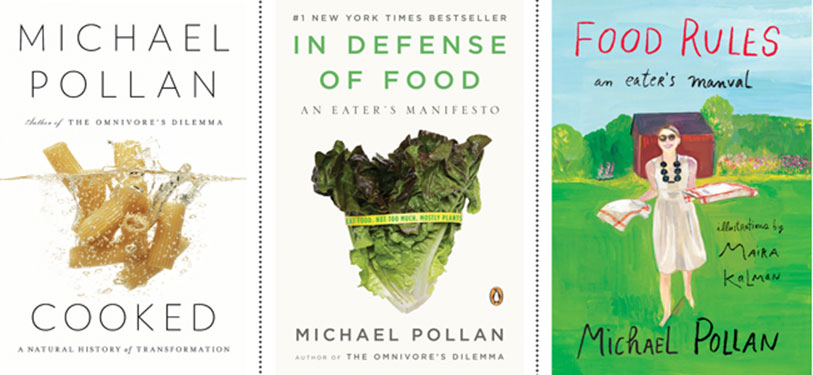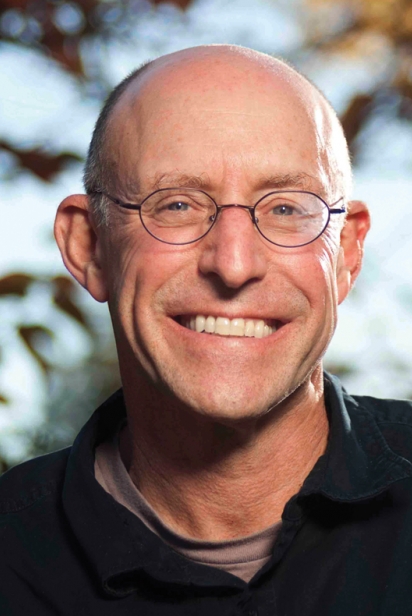Food Activist Michael Pollan Visits Pittsburgh
Photographs from Fran Collin, Sara Bixler
It was 12:15 p.m. in Pittsburgh and 9:15 a.m. in Berkeley, Calif. when Michael Pollan and I began our casual conversation, rooted in material. That morning, he had cooked eggs and toasted homemade bread for his wife, Judith. And, the pair had completed a habitual morning mile jaunt to The Cheese Board for coffee. A New York Times best-selling author, Pollan has influenced his peers, readers, and students on the ideals of nature versus human industry, stressing we are what we eat, for 25 years. To think it all started with an American author and philosopher during a master’s program in English at Columbia University. “My focus was Henry David Thoreau and the whole tradition of nature writing,” says Pollan. “Our worship of wilderness had me thinking about the rest of the landscape. I had begun to garden in a serious way. I thought ‘We have a wilderness ethic, but what would a garden ethic look like?’ In a way, all my work on food has flown from that.”
In his new book, “Cooked: A Natural History of Transformation,” Pollan goes back to basics with the four classic elements, Earth, Water, Air, and Fire. “It was kind of serendipity,” he says. “I started digging in and knew I was going to write about Fire and Water because those are primal and central in cooking.” Judith brought to his attention how Earth and Air fit into the puzzle. “Earth was easy because it is a hotbed of microbes and fermentation, some of which do come from the soil. So, that left Air and adding air to our food, i.e. bread. What’s striking to me is that these four elements, even as dated as they might seem, still explain a lot about how the world works.”
On May 10, Pollan will present his new pages and much more at The Hillman Center for Performing Arts at Shady Side Academy in Fox Chapel, with big Burrito Restaurant Group Corporate Chef Bill Fuller as his interviewer. “I plan to talk about the role of cooking in our lives, ranging from health to political change,” he says. “If we’re hoping to reform the food system in such a way as to support local and sustainable agriculture, it’s just not going to happen if people are going to outsource all their cooking to corporations. The longer I’ve worked on these issues, the more I’ve come to see that personal dimension is central to the whole project.”
Named one of Time’s 100 most influential people, Pollan makes personal choices in the kitchen to “reconnect his senses.” He and his wife raised their son, Isaac, with an adoration for cooking. So much so, Isaac has become chef-elect among his college friends. “I like the whole ritual of cooking a meal,” says Pollan. “It’s a great way to end the day — the wonderful smells, handling the plants, animals, and fungi. My wife and I catch up on our days while we chop vegetables. It’s a big part of the rhythms of our life.”
Cooking in good company comes with a desire for good health and beginning with raw, primal materials. “The wider public is taking an interest in these issues — including GMO [genetically modified organisms] labeling,” says Pollan. “The popularity of the GMO-Free label in the supermarket has never been greater. More and more people are learning about this and deciding they don’t want to eat GMO products. General Mills announcing Cheerios would be GMO-Free is just an indication. From a company that’s essentially on both sides of the issue, it suggests there’s a little schizophrenia in the food industry right now on what to do about GMO.”
Pollan’s campaign to show Americans cooking can fit into our modern lives includes the outcome — “a great life satisfaction.” “There are snacks everywhere, we’re immensely marketed to, and it’s hard to go to a meeting without 600-calorie muffins showing up. But, I think we’ve convinced ourselves it’s harder than it is. We all still know what real food is and cooking takes care of that.”
A few years ago, he released seven food rules that can be summed up in seven words: “Eat food, not too much, mostly plants.” To summarize, his rules include: “Don’t eat anything your great-grandmother wouldn’t recognize as food. Don’t eat anything with more than five ingredients, or ingredients you can’t pronounce. Stay out of the middle of the supermarket; shop on the perimeter of the store. Don’t eat anything that won’t eventually rot. It is not just what you eat but how you eat. Enjoy meals with people you love. Don’t buy food where you buy your gasoline.”
Pollan particularly finds school lunch reform at the basis of a total food system reversal. “The Let’s Move program has made some positive moves on school lunch,” he says. “There is more money for fresh produce, but it’s certainly not enough. They’ve added an apple, and taken out fruit and sugar syrup, which is very positive. Also positive are the strong rules on marketing to children in schools. Everything we do at school teaches kids a set of values. [Without change], we’re teaching them food is fast, cheap, and easy. That’s shameful. It’s going to take some serious dough to change that. In the meantime, make a sandwich for your child. Michelle Obama took it as far as she could, but it has to go a lot further.”
Mom’s blue casserole dish transports Pollan to his childhood, for it was the start of myriad, meaningful meals. Today, he uses black La Chamba pottery from Central America for anything from braises and stews to roasting potatoes. “These are future heirlooms in our family,” he says. “It’s really beautiful stuff to cook with. It’s really tough and gorgeous, and kind of rough looking. These things have become very important parts of the kitchen — they last forever.”
Forever. A word vastly valuable in today’s tech-centered society. While we don’t live forever, Pollan’s message steers home the importance of agricultural adjustments, and improved transitions of farm to table to fork, for a forever full-in-health lifestyle.
Michael Pollan, michaelpollan.com.
For tickets to A Conversation with Michael Pollan at The Hillman Center for Performing Arts, visit TheHillman.org.






